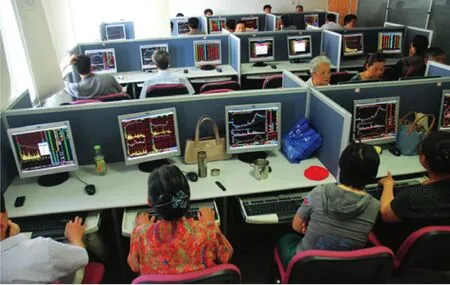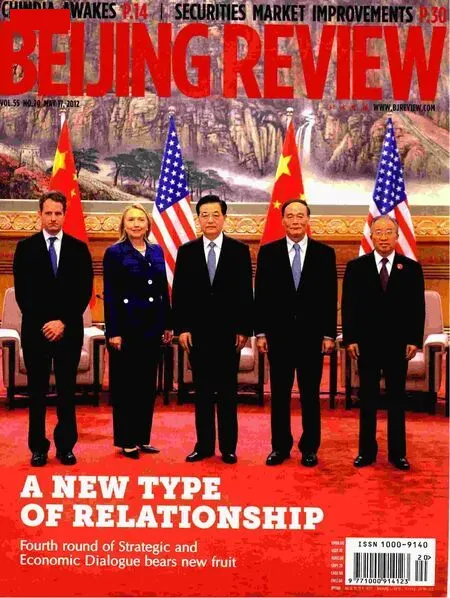Making a Better Capital Market A series of new measures aim to ensure fairness, maintain sound development and protect investors’ interests
By Lan Xinzhen
Making a Better Capital Market A series of new measures aim to ensure fairness, maintain sound development and protect investors’ interests
By Lan Xinzhen
Guangxia (Yinchuan) Industrial Co. Ltd. is a company well passed its prime on the Shenzhen stock market. Most investors agree it should have been swept from the trading floor and delisted a decade ago.
A trade suspension and reorganization is now headed by Ningxia Ningdong Railway, but ultimately hopes are low for the company that has been mired in controversy since 2001 when the media exposed a corporate plot to fabricate earnings reports and other information. The result was a nosedive in its stock price from 37.99 yuan ($6.02) to 2 yuan ($0.32) in 2002. And yet the company was allowed to shamble along for another 10 years, albeit more slowly and with a *ST tag, indicating that its fate was hanging in the balance.
According to SZSE figures, in 2011 Guangxia reported earning per share of 0.336 yuan ($0.05), net asset per share of -0.74 yuan ($-0.12), operating revenue of 0 yuan and net profts of -23,063.62 yuan ($-3,655.09).
If the reorganization fails, Guangxia will be forced to delist from the stock market under a new policy from the China Securities Regulatory Commission (CSRC), which was meant to make yet another improvement to China’s securities market.
On April 29, 2012, both Shanghai Stock Exchange (SHSE) and Shenzhen Stock Exchange (SZSE) publicized drafts of the new policy to collect opinions from institutional and individual investors.
The new policies will hopefully prevent cases like Guangxia from arising in China’s stock market as it seeks to improve the capital market.
“In countries with a sound mechanism in capital market, stocks like Yinguangxia should have been delisted years ago,” said Wang Yong, a researcher at CITIC Securities Co. Ltd. But Yinguangxia was allowed to remain in the stock market due to trading mechanism riddled with loopholes and vague rules. Now, the CSRC hopes to improve that mechanism.
Influence of new policies
The guiding opinions on deepening reform of the new stock issuance mechanism released on April 28 are the first new policy by the CSRC.
Kou Jianxun, an analyst at Soochow Securities, said the influence of the guiding opinions focuses on information disclosure, pricing in the primary market and trading in the secondary market. The guiding opinions’ top priority requires listed companies to disclose all relevant information, fully indicating the resolution of the CSRC to solve the problems existing in the A-share market.
Information disclosure is the core of U.S. federal securities supervision mechanism, a model the Chinese market is trying to replicate. It is also the major reason the United States has a more relaxed regulation and registration system on stock issuance. In China, information disclosure is a luxury most investors don’t enjoy, and insider trading is rife throughout the Chinese stock market.
Kou said the guiding opinions will reduce
P non-standard information disclosure and raise investor confdence in a still developing stock market. People can expect that problems such as abnormal rise in stock prices on the day of issuance or excessive price-earnings ratio for newly issued stocks will be markedly reduced.
The second new policy will regulate the delisting process for stocks. On April 29, both SHSE and SZSE publicized drafts for the exit system to collect public opinions.
学生的习作若始终保持着幼年的童真童趣,那便是最好的习作。我们期待在习作中,学生能展现自己独特的个性和风格,在童言中抒真情,吐真意,擦亮习作的星空。
The two drafts both take lessons from common practices of international securities markets and set a standard for exit of stocks. This will end the current situation that stocks in Chinese stock markets never die.
According to figures from the two stock exchanges, among the 2,381 listed companies that have publicized 2011 annual reports, 39 would have been delisted from the stock market according to the exit standard.
SHSE will allow a grace period of 30 trading days for stockholders to arrange overthe-counter (OTC) transfer of stocks. SZSE allows stocks of delisted companies to enter qualifed OTC markets.
The third new policy is that the two stock exchanges and China Securities Depository and Clearing Corp. Ltd. announced on April 30 to reduce A-share transaction fees. It is estimated that a total of 3 billion yuan ($475.44 million) of transaction fees will be exempted till the end of this year.
Bai Yuwei, an investment consultant of Great Wall Securities, said, “Reducing A-share transaction fees will directly beneft securities companies and listed companies, and the benefts to individual investors will be indirect.”
According to Bai, reducing transaction fees will directly lower costs of securities companies and listed companies. Considering competition factors, securities companies may reduce commission fees upon individual investors in the future.

CFP
May 2 was the first trading day after China’s May Day holiday, and stock prices in the A-share market were on the rise. The Shanghai Stock Exchange Composite Index rose by 1.76 percent and the Shenzhen Stock Exchange Component Index rose by 2.4 percent. However, almost all the 141 ST stocks in the A-share market touched the decline limit. Obviously, the new policy has imposed a largely positive impact on the market.
Regulate the market
Deng Yuwen, senior editor ofStudy Times, a newspaper that researches China’s reform and social transformation, said the securities watchdog issued a series of new policies that emphasized protecting the capital market by the government. More importantly, the new policies also involve changes to the basic mechanism of the stock market, with milestone signifcance to the improvement of the overall market system.
The Chinese stock market has been declining for nearly five years after hitting a record high in October 2007. Although stock indices rose in 2009, revitalized by the 4-trillion yuan ($633.91 billion) stimulus package and relaxed monetary policy, performance of China’s A-share market in the last five years is the world’s poorest, contrary to the fast-growing Chinese economy in the same period.
Deng attributed the sluggish Chinese A-share market to various ailments—pessimistic expectations on the economic situation and the number of stocks among them—but the most important and unavoidable reason is systematic defects in the stock market. In the government-led A-share market, problems involved in new stock issuance, dividends of listed companies, exit system and information disclosure have adversely affected investors’ confdence and restricted the role of the capital market that should have played in facilitating Chinese economic development and restructuring.
According to Deng, among these new policies, reforming the stock issuance system and improving exit standards are critical to the market’s sound development. Among the various cruxes in the A-share market, listing and exiting are the core deciding factors that determine whether the capital market is sound or fuid. The problems of “high issuance price, high price-earnings rate and high oversubscription” for new stock issuance, as well as existence of a large number of ST companies, are the results of the phenomenon of easy listing and hard exiting. These problems have not only damaged the sound development of the stock market, but also directly damaged the interests of investors, especially individual investors.
“Only by thoroughly reforming the stock market can we obtain sound development of the capital market and ensure investors get reasonable returns,” Deng said.
Xie Jijun, Managing Director of Investment Banking at China Merchants Securities, wrote in his blog that besides technical reforms, China’s capital market also needs some fundamental systematic changes to ensure investors’ interest and promote sound development of the market. These changes include establishing a class action system for investors, prohibiting reverse mergers, adopting an exit system, establishing a special supervision system on oversubscribed funds, regulating the time interval of refnancing by listed companies and changing their habit of stressing fnancing at the cost of neglecting dividends.
Hu Jizhi, President of Guosen Securities Co. Ltd., said starting from 1992 when SZSE was established, China’s capital market is now 20 years old. In the frst decade, reasons for the existence of the capital market were fgured out; in the second decade, development of the capital market was incorporated into state strategies, and some basic problems, such as split share structure reform and comprehensive regulation of securities companies, were solved; and the third decade beginning this year will be an important period to improve China’s capital market.
Hu said at present China’s capital market does face many urgent problems, including some complicated ones. Among them, whether China can get through the passage connecting the capital market and the real economy will be the biggest task.
lanxinzhen@bjreview.com

